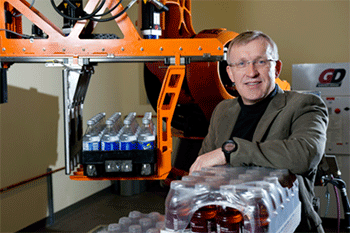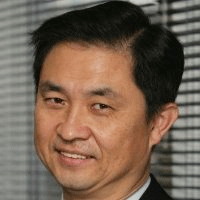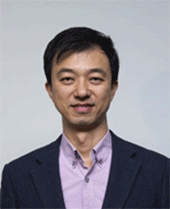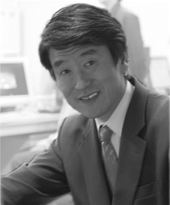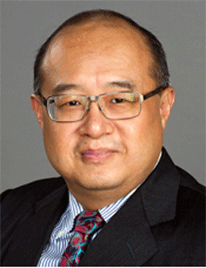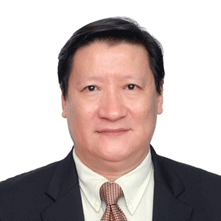Government Forum
| Thursday Oct. 13, 09:35 am ~15:00 pm, Room #301 | |||||||||||||||||||||||||||||||||||||||||||||||||||||||||||||||||
| Sungchul Kang (KIST, Korea) Christian Ott (DLR, Germany) Kensuke Harada (Osaka Univ./AIST, Japan) Barbara Mazzolai (IIT, Italy) |
|||||||||||||||||||||||||||||||||||||||||||||||||||||||||||||||||
| In this government forum, major robotics R &D and education program supported by the government of each county (or region) will be introduced. Policy makers, national project leaders and researchers in robotics R&D program around the world will come together and discuss how to make the robotics R&D program have an impact on the existing and emerging industries in robotics. As well as dealing with the major robotics R&D program of US, EU, Asia, Oceania and so on, this forum will try to find key issues in the government program and to discover real success stories saying that the government support program has been greatly contributive in robotics R&D and education. | |||||||||||||||||||||||||||||||||||||||||||||||||||||||||||||||||
|
|||||||||||||||||||||||||||||||||||||||||||||||||||||||||||||||||
| Speaker: Prof. Henrik Christensen | |||||||||||||||||||||||||||||||||||||||||||||||||||||||||||||||||
| Title: TBD | |||||||||||||||||||||||||||||||||||||||||||||||||||||||||||||||||
|
|||||||||||||||||||||||||||||||||||||||||||||||||||||||||||||||||
| He has published more than 350 contributions across AI, robotics and vision. His research has a strong emphasis on "real problems with real solutions". A problem needs a theoretical model, implementation, evaluation, and translation to the real world. He is actively engaged in the setup and coordination of robotics research in the US (and worldwide). Dr. Christensen received the Engelberger Award 2011, the highest honor awarded by the robotics industry. He was also awarded the "Boeing Supplier of the Year 2011" with 3 other colleagues at Georgia Tech. Dr. Christensen is a fellow of American Association for Advancement of Science (AAAS) and Institute of Electrical and Electronic Engineers (IEEE). He recieved an honorary doctorate in engineering from Aalborg University 2014. He collaborates with institutions and industries across three continents. His research has been featured in major media such as CNN, NY Times, BBC, ... . | |||||||||||||||||||||||||||||||||||||||||||||||||||||||||||||||||
| Speaker: Dr. David Han | |||||||||||||||||||||||||||||||||||||||||||||||||||||||||||||||||
| Title: TBD | |||||||||||||||||||||||||||||||||||||||||||||||||||||||||||||||||
|
|||||||||||||||||||||||||||||||||||||||||||||||||||||||||||||||||
| He had been a research engineer at the Naval Surface Warfare Center (NSWC) at White Oak in the underwater weapons program, and had worked as a senior professional staff at Johns Hopkins University Applied Physics Laboratory (JHU APL) in naval missile defense and satellite power programs. He had been with the University of Maryland at College Park as a visiting associate professor and the Deputy Director of the Center for Energetic Concepts Development (CECD), and also he was the Distinguished IWS Chair Professor of the Systems Engineering Department of the US Naval Academy in Annapolis. He spent over eleven total years as a program officer at the Office of Naval Research (ONR) managing basic and applied research, and advanced technology programs. From 2012 to 2014 he served as the Deputy Director of Research of the Office of Naval Research (ONR) overseeing the Discovery and Invention (D&I) portfolio of over $900 million dollars annually of basic and applied research. Dr. Han has authored/coauthored over 60 peer-reviewed papers including 4 book chapters. He has taught at Johns Hopkins University, University of Maryland Baltimore County, and Korea University. His research interests include image/speech processing and recognition, machine learning, and human robot interaction. | |||||||||||||||||||||||||||||||||||||||||||||||||||||||||||||||||
| Speaker: Prof. Stefano Stramigioli | |||||||||||||||||||||||||||||||||||||||||||||||||||||||||||||||||
| Title: euRobotics, the European Robotic ecosystem | |||||||||||||||||||||||||||||||||||||||||||||||||||||||||||||||||
| Abstract: In the presentation euRobotics and its relation to SPARC will be presented. euRobotics was born as the private side in the SPARC Public Private Partnership with the European commission, but it is growing behind this role in being the association representing the industry and research eco-system in Europe. | |||||||||||||||||||||||||||||||||||||||||||||||||||||||||||||||||
|
|||||||||||||||||||||||||||||||||||||||||||||||||||||||||||||||||
| He is involved in different projects related to Control and Robotics for medical, inspection and home and care applications. Nationally, he has been a member of the Management team of the graduate school DISC, has been the founder and chair of RoboNED, the national platform coordinating all academic, industrial and governmental institutions on Robotics and responsible for producing a Strategic Research Agenda for Robotics for the Netherlands and he is one of the initiator of the LEO ( www.leo-robotics.eu) robotics center, the first robotic center in the Netherlands. Among others he has been the 2009 recipient of the IEEE-RAS distinguish service award, the 2016, European Forum Tech Transfer Award and the 2016 Best Design Award at the Hamlyn Symposium on Surgical Robotics. He is currently serving as the Vice President for Research of euRobotics, the private part of the PPP cooperation with the European Commission known as SPARC, the biggest robotic civil program worldwide. Google Scholar: https://scholar.google.com/citations?user=BvmnBz4AAAAJ Research Gate: https://www.researchgate.net/profile/Stefano_Stramigioli |
|||||||||||||||||||||||||||||||||||||||||||||||||||||||||||||||||
| Speaker: Prof. Eugenio Guglielmelli | |||||||||||||||||||||||||||||||||||||||||||||||||||||||||||||||||
| Title: FLAG-ERA: The Network of European funding agencies to support the Flagship ------ Projects on Future Emerging Technologies (FET). |
|||||||||||||||||||||||||||||||||||||||||||||||||||||||||||||||||
| Abstract: Since 2010, the European Commission launched the FET-Flagship programme to select and co-fund up to 1 billion euro a limited number of 10-year, disruptive flagship projects on future emerging technologies. Currently, two flagship programmes have been funded and have completed their 3-year ramp-up phase, the Graphene Project and the Human Brain Project. One additional flagship project on Quantum Computing will start this year. Other four pilot flagships plus about twenty other candidate flagships are currently competing for being supported in the next 2021-2030 time frame. Some of the current flagships and pilots include robotics & automation topics. A group of funding agencies from all the European Member States promoted a network to provide flagship projects with significant co-funding and promote synergy with other ongoing National and Regional Programmes in order to ultimately gather a critical mass of human capital and innovation resources so to generate a real disruptive impact on science, technology and industry. The talk will briefly present the FET-Flagship programme goals and current status. Then it will specifically report about the ERANET Flag-Era projects and activities, with a specific focus on robotics and automation-related topics currently being addressed by the ongoing flagships, as well as by the pilots and candidate proposals. | |||||||||||||||||||||||||||||||||||||||||||||||||||||||||||||||||
|
|||||||||||||||||||||||||||||||||||||||||||||||||||||||||||||||||
| He is author/co-author of more than 200 papers appeared on peer-reviewed international journals, conference proceedings and books. He currently serves as Vice-President for Publication Activities of the IEEE Robotics & Automation Society (RAS), as Member of the Board of Funders of the FET-Flagship European Programme and as the Delegate of the Italian Ministry of Education, University and Research (MIUR) in the Executive Board of the ERANET FLAG-ERA Programme. | |||||||||||||||||||||||||||||||||||||||||||||||||||||||||||||||||
| Speaker: Dr. Kyung-Hoon Kim | |||||||||||||||||||||||||||||||||||||||||||||||||||||||||||||||||
| Title: Robot R&D Strategy of Korea | |||||||||||||||||||||||||||||||||||||||||||||||||||||||||||||||||
| Abstract: Korea has legislated the Intelligent Robots Development and Distribution Promotion Act in 2008 and a master plan for intelligent robotics, which summarizes analysis and strategies, is established every 5 years. Ministry of Trade, Industry and Energy(MOTIE) is in charge of establishment and execution of the master plan. Korea is the 4th biggest industrial robot market and shows the highest robot density record (per 10,000 employees) in the world. Korean robot industry has grown 21% in average for last 6 years. However, it has not been globalized and is relatively small-sized, compared to other Korean industries, such as semiconductor, automobile, smart phone, TV and batteries. This presentation will summarize the R&D and promotion strategies that MOTIE is pursuing to strengthen the robot (and overall) industry in Korea. | |||||||||||||||||||||||||||||||||||||||||||||||||||||||||||||||||
|
|||||||||||||||||||||||||||||||||||||||||||||||||||||||||||||||||
|
|||||||||||||||||||||||||||||||||||||||||||||||||||||||||||||||||
| Speaker: Tomomasa SATO | |||||||||||||||||||||||||||||||||||||||||||||||||||||||||||||||||
| Speaker: Professor emeritus of Univ. of Tokyo / NEDO advirsory (robot and AI Deoverview Speaker: of ropartment) |
|||||||||||||||||||||||||||||||||||||||||||||||||||||||||||||||||
| Title: Declaration of Robot Revolution and Successive Robot R&D Projects in NEDO | |||||||||||||||||||||||||||||||||||||||||||||||||||||||||||||||||
| Abstract: The presentation explains the overview of robot R&D project in NEDO(New Energy and Industrial Technology Development Organization). The presentation starts by explaining the "Declaration of Robot Revolution" that was announced by Prime Minister Shinzo Abe in 2014 and describes the successive activities by the Japanese Government which lead to several robot projects which deal with such targets as 1) Robot R&D for infrastructure maintenance and disaster, 2) Promotion of Market Implementation by Applying Robotics, 3) Future Robot Technology Development, and 4) the world robot summit (RMS)that will be hosted by Japan in 2020. Detailed explanation wil be presented about the WRS. The WRS consists of robot competitions called the "World Robot Challenge" and exhibition of the latest robot technologies called the "World Robot Expo." The WRS aims to establish a long-lasting initiative that will be continued after 2020 as the legacy which accelerates the social implementation of robots around the world. | |||||||||||||||||||||||||||||||||||||||||||||||||||||||||||||||||
|
|||||||||||||||||||||||||||||||||||||||||||||||||||||||||||||||||
| Speaker: Professor I-Ming Chen | |||||||||||||||||||||||||||||||||||||||||||||||||||||||||||||||||
| Speaker: School of Mechanical and Aerospace Engineering Speaker: Nanyang Technological University Speaker: Singapore |
|||||||||||||||||||||||||||||||||||||||||||||||||||||||||||||||||
| Title: National Robotics R&D in Singapore | |||||||||||||||||||||||||||||||||||||||||||||||||||||||||||||||||
| Abstract: This presentation will focus on three topics: 1) the overarching new national technology plan – Research, Innovation and Enterprise 2020 (RIE2020) of Singapore; 2) the upcoming National Robotics Program for Singapore; and 3) Future of Manufacturing Initiative of Singapore. The Robotics R&D Task Force convened by National Research Foundation of Singapore (NRF) in 2014 has made recommendation of a deliberate strategy to build up a robotics ecosystem in Singapore to achieve the aspirations of build-up of a robotics capability in Singapore with an opportunity to go beyond being a smart consumer to become a smart developer of robotics technologies, systems and solutions to not only serve but shape the worldwide robotics wave as well. The recommendation includes: |
|||||||||||||||||||||||||||||||||||||||||||||||||||||||||||||||||
|
|||||||||||||||||||||||||||||||||||||||||||||||||||||||||||||||||
| The main objectives of National Robotics Programme are to identify opportunities for early adoption of robotics solutions in the public sectors as well as to develop long-term R&D programme for the build-up of a strong scientific foundation in robotics enabling technologies. The vision of NRP will be to create a vibrant and innovative robotics ecosystem capable of providing solutions to fuel the Smart Nation initiative and to establish Singapore as a global centre of excellence for the study, research, development, making and application of robotics solutions. Lastly I will briefly talk about the Future of Manufacturing Initiative from Singapore's Agency for Science, Technology and Research (A*Star), which aims to strengthen Singapore manufacturing for developing and adopt disruptive technology in manufacturing setting for the future competitiveness of Singapore economy. |
|||||||||||||||||||||||||||||||||||||||||||||||||||||||||||||||||
|
|||||||||||||||||||||||||||||||||||||||||||||||||||||||||||||||||
| Currently he is senior editor of IEEE Transactions on Robotics. Professor Chen is Fellow of IEEE and Fellow of ASME, General Chairman of 2017 IEEE International Conference on Robotics and Automation (ICRA 2017) in Singapore. | |||||||||||||||||||||||||||||||||||||||||||||||||||||||||||||||||
| Speaker: Dr. Le Hoai Quoc | |||||||||||||||||||||||||||||||||||||||||||||||||||||||||||||||||
| Title: "Robotics and Automation" R&D and Education in Vietnam | |||||||||||||||||||||||||||||||||||||||||||||||||||||||||||||||||
| Abstract: From one of the world's poorest country, Vietnam has spurred rapid economic growth and transformed to a developing country. With more than 40% GDP contribution to the economy, the industrial sector has played an important role in this reform. And to serve the cause of the country's industrialization and modernization, major R&D and education program has been supported by the government since year 1990s. Many achievements not only contributed to the increasing of the productivity in manufacturing, construction and industry but also improved the technical development of other economic sectors such as agricultural, healthcare. Nowadays, the trend of globalization is both an opportunity and a challenge for the economy in general and industry in particular of Vietnam. In the eyes of foreign investors, the country will be very attractive with government policies encouraging FDI to high technology sectors, where the field of robotics and automation has a significant role. With the development in line with the world and in the country, R&D and education programs in robotics and automation especially in supporting to industry may contribute significantly to the development of the Vietnam. | |||||||||||||||||||||||||||||||||||||||||||||||||||||||||||||||||
|
|||||||||||||||||||||||||||||||||||||||||||||||||||||||||||||||||
| In 2009, he joined the Saigon High Technology Park (SHTP) as vice president, and then became the president from 2011 until now. He now is also the vice president Vietnam Association of Robotics. His research interests include robotics kinematics and dynamics, mechanical design, and automation control. With achievements in R&D and education, he received grants from the People's Committee of Ho Chi Minh City (2004, 2005, 2012) and Prime Minister in 2005. In 2011, he was awarded the 3rd Labor Medal from the President of the Socialist Republic of Viet Nam. |
|||||||||||||||||||||||||||||||||||||||||||||||||||||||||||||||||







